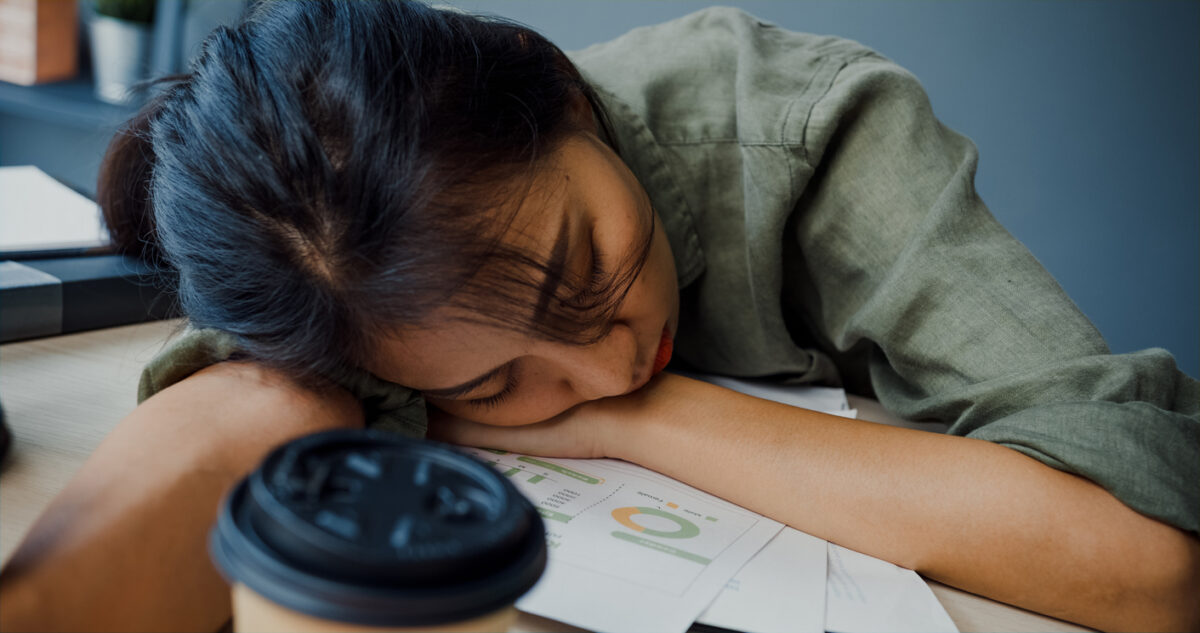Feeling sluggish and drowsy during the day is a common problem faced by many people. This lethargy can interfere with your daily routine, from work to personal tasks. Regular occurrences could be telling signs of underlying health concern, and it merits further investigation.
This comprehensive guide discusses various strategies to help you avoid daytime sleepiness. It will delve into lifestyle modifications, diet changes, and proper sleep hygiene.
Our aim is not just to help you stay alert during the day, but also to improve your overall quality of life. So, sit back, keep an open mind, and let’s unlock the secret on how to curb daytime fatigue effectively.
Understanding Daytime Sleepiness
Causes and Factors of Daytime Sleepiness
Daytime sleepiness is often the result of several factors such as insufficient sleep, irregular sleep schedules, sedentary behavior, poor diet, certain medications, and medical conditions like sleep apnea, narcolepsy, or depression. Hormonal imbalances or a lack of exposure to natural light can also contribute to excessive daytime drowsiness.
To avoid sleepiness during the day, ensure you get enough quality sleep at night. Implement a regular sleep-wake schedule and stick to it, even on weekends. A healthy diet that includes plenty of proteins, fruits, and vegetables can help maintain energy levels.
Regular exercise can also aid healthy sleep patterns and increase daytime alertness. Additionally, limit your intake of caffeine, nicotine, and alcohol, which can interfere with sleep. Lastly, if daytime sleepiness persists, make sure to seek medical advice to rule out underlying medical conditions that may be causing this issue.
The Impact of Daytime Sleepiness on Your Daily Life and Lifetime

Daytime sleepiness can greatly impact individuals’ daily lives and long term health. People experiencing this often suffer from concentration issues, difficulty in making decisions and reduced productivity, which can affect not only their professional lives but also personal activities. It also can lead to chronic health issues like diabetes, heart diseases or obesity.
Effective Techniques to Avoid Daytime Sleepiness
Are we doomed to yawn through our days, or can we combat this common foe, daytime sleepiness? The answer is a resounding yes – we can and we must. This chapter delves into practical, achievable strategies that can help us fight off the urge to sleep during the day. Whether it’s making changes in our diets, modifying our sleep patterns, or introducing new lifestyle habits, we will guide you through tried and tested methods that help you avoid daytime sleepiness. Let’s reclaim our energy and productivity, one wakeful day at a time.
Keeping a Consistent Sleep Schedule
Keeping a consistent sleep schedule is a crucial part of maintaining good health and avoiding daytime sleepiness. Here are a few tips on how to achieve this:
1. Set a consistent bedtime and wake-up time: This regulates your body’s internal clock, helping you fall asleep and wake up more easily. Try to keep the same sleep schedule even during the weekends.
2. Avoid heavy meals and caffeine before bedtime: These can hinder your ability to fall asleep or lead to restless sleep.
3. Regular exercise: Regular physical activity can help you sleep better and feel more energized during the day.
4. Limit daytime naps: Too much sleep during the day can interfere with your sleep at night, causing you to feel drowsy throughout the day.
5. Make your sleep environment comfortable: A cool, quiet, and dark room can help you get quality sleep.
By following these steps, you can help ensure a consistent sleep schedule and avoid daytime fatigue. Consistent sleep not only improves productivity and mood but also contributes to overall health and wellness.
Ten Methods to Try When You’re Struggling with Poor Sleep Onset
But, you may complain that you can’t fall asleep quickly, even if we recommend you to sleep on a consistent schedule. Here are some ideas you can try when you have difficulty falling asleep.
1. Deep Breathing: Slow, deep breaths can help relax your body and mind, which may make falling asleep easier.
2. Reading a Book: This can help relax your mind and take your thoughts off any problems or worries you might have.
3. Listening to Soft Music: This can help relax your body and mind, making it easier for you to fall asleep.
4. Listening to a YouTube explanatory video about something interesting enough for you to hear but not too exciting.
5. Progressive Muscle Relaxation: Tense and then relax each muscle group, starting with your toes and working your way up to your head.
6. Visualization: Imagine a calming, peaceful place or situation to help you relax and fall asleep.
7. Yoga or Gentle Stretching: This can help relax your muscles and quiet your mind.
8. White Noise: Whether it’s a fan, air conditioner, or a white noise app, constant, predictable noise can help lull you to sleep.
9. Essential Oils: Lavender, chamomile, and other peaceful scents can help set the mood for sleep.
10. Trying the 4-7-8 Breathing Method: Breathe in for 4 seconds, hold your breath for 7 seconds, and then breathe out for 8 seconds. This can help lower stress and induce sleep.
The Role of Healthy Nutrition in Preventing Sleepiness
Healthy nutrition plays a crucial role in preventing daytime sleepiness. Consuming a well-balanced diet fuels the body with essential nutrients and energy needed to remain alert and focused. Breakfast, being the first meal of the day, sets your energy level for the day. Consuming protein-rich foods can improve alertness.
It is recommended to include whole grains, fruits, vegetables, lean proteins, and healthy fats in your meal. Carbohydrates are especially important as they are the body’s preferred energy source. Opt for complex carbohydrates like whole grains, legumes, and fruits which digest slowly, providing a steady energy source.
Avoid processed foods, and sugary snacks and drinks, as their quick digestion can cause an energy crash, leading to fatigue and lethargy. Hydration is another key factor; dehydration can cause fatigue and impact cognitive function. Spread out your meals and snacks throughout the day to avoid energy dips.
Protein-rich foods, such as lean meats, eggs, and nuts, contribute to alertness. Also, B-vitamins found in foods like avocados, legumes, green vegetables, and whole-grains may improve daytime alertness due to their role in energy metabolism.
Remember, moderation and variety are key when it comes to nutrition. Avoid skipping meals as this can lead to energy dips and excessive sleepiness.
Use of Exercise to Combat Daytime Sleepiness
Beneficial Types of Exercise for Energy
If you frequently feel sleepy during the day, engaging in specific types of exercises can help boost your energy levels.
1. Aerobic Exercises: Regular aerobic activities like jogging, walking, cycling, or swimming increases your heart rate, improves circulation, and can wake up sleepy muscles.
2. Strength Training: Though might feel intimidating, lifting weights helps the body maintain a balanced metabolism which can contribute to energy regulation throughout the day.
3. Yoga: The slow, controlled movements and deep-focused breathing offer incredible energy-boosting benefits. Not only does it increase physical energy, but it also helps clear mental fog.
4. High-Intensity Interval Training (HIIT): Short bursts of intense activity followed by short recovery periods can significantly improve energy levels.
5. Tai Chi: This low-impact, slow-motion exercise can boost energy by reducing stress and helping you stay focused.
Remember, consistency is essential. Choose exercises you enjoy and can incorporate into your daily routine. Always consult with a healthcare professional before commencing a new exercise regimen.
The Best Time to Exercise to Avoid Feeling Sleepy
The best time to exercise to avoid feeling sleepy during the day is in the morning. A morning workout can increase your energy levels and alertness for the rest of the day. Furthermore, exercising in the morning can improve your sleep at night, contributing to less daytime fatigue.
If it’s not possible to exercise in the morning, avoiding workouts too close to bedtime can also help, as exercise stimulates the body which can interfere with sleep onset. Thus, try to exercise at least 3 hours before sleeping.
But remember, everyone is different. The key is to establish a consistent exercise routine at a time that best fits your schedule and body.
Can Caffeine and Supplements Help?
Yes, caffeine and certain supplements can potentially help in combating daytime sleepiness. Caffeine is a known stimulant that keeps you awake by blocking sleep-inducing chemicals in the brain and increasing adrenaline production.
Supplements like Vitamin B12, Iron, and Coenzyme Q10 may help as they are essential for energy production. Another supplement, Melatonin, may help regulate sleep-wake cycles, especially for those with sleep disorders.
However, these aids should be considered as temporary fixes. It’s better to address the root causes of daytime sleepiness as we have discussed above.
Pros and Cons of Using Caffeine
Pros of using caffeine include increased alertness and concentration, which can help you avoid sleepiness during the day. It can enhance performance in cognitive tasks and physical endurance. Caffeine can also stimulate the release of dopamine, providing a temporary mood lift.
On the other hand, cons include possible addiction and withdrawal symptoms such as headaches, irritability, and excessive sleepiness.
Prolonged use of caffeine can potentially disrupt sleep patterns and cause insomnia. High doses might result in rapid heart rate, anxiety, and digestive issues. Regular consumption can lead to increased tolerance, requiring more caffeine to achieve the same effects.
Alternating caffeine intake with other methods like taking short naps or maintaining a consistent sleep schedule might reduce the risks.
Recommended Dietary Supplements for Energy
Increasing energy and avoiding daytime sleepiness can be achieved through proper nutrition, exercise and adequate sleep. Nevertheless, sometimes dietary supplements can provide extra help. Among them, B-complex Vitamins are key in converting food into energy. Coenzyme Q10 aids in fueling energy production in our cells, and Iron which helps to deliver oxygen throughout our bodies.
One natural dietary supplement that is highly recommended is Juveriente’s® Effisoy®. This supplement helps to balance your hormone through organizing your synthesis ability of hormone precursors. It is gaining reputation rapidly with such an effect among females suffering from menopause symptoms.
It also has high antioxidant properties, which helps in reducing oxidative stress and improving energy production.
Before starting any supplement, it’s crucial to consult your healthcare provider, as they can cause interactions with certain medications and conditions.
Is your daytime sleepiness a sign of a decease?
Daytime sleepiness can be a sign of various conditions, including sleep apnea, narcolepsy, insomnia, or circadian rhythm sleep disorders. It may also be a symptom of other health issues like depression, anemia or a thyroid problem.
However, it can also be caused by certain lifestyle factors like lack of exercise, poor diet, or inadequate sleep.
If you are constantly feeling tired during the day, it’s important to consult a healthcare professional. It’s not typically normal to feel overly sleepy in the daytime and could be a sign of an underlying health issue.
A natural supplement to balance your hormone, extracted from Miso
Miso soup made from Miso, fermented soybean paste is a Japanese staple. Miso has a lot of health benefits and makes Japanese people healthy. One notable benefit of Miso is that Japanese women experience far easier menopausal experiences than Westerners. You can enjoy the same health benefits with this natural supplement.
Juveriente®’s Effisoy, launched in 2016, based on fermented soybean germ extract has been loved as a natural menopause relief since its launching in 2016.
Its primary function is to boost the weakened synthesis of a hormone precursor, DHEA. It’s safe as it only heals the natural synthesis function. The hormone boost doesn’t provide the only relief from menopausal symptoms. It also supports various aging and hormonal imbalance issues like insomnia, weight increase by aging, etc.
Here are some of the real product reviews in our Amazon shop.
“Restful sleep finally!!”, “I Am Now Free of Hot Flashes!!”, “Lifesaver”







